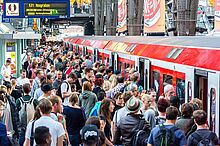FPOplus
Timetable optimization through flow management of passenger transfers
Timetable optimization through a Al-based solution for better predictability in the flow management of passenger transfers.
Sub-project: Scientific-technical basics as well as legal and data protection issues with subsequent real application in the station (universities).
Funded by: BMDV / TÜV Rheinland Consulting GmbH bzw. VDI/VDE
Runtime: 01.05.2023 - 31.12.2025
Project Coordinators: HafenCity Universität Hamburg, Prof. Dr. Stefan Fischer (University of Lübeck) & Prof. Dr. Ralf Möller (University of Hamburg) & Prof. Dr.-Ing. Nele Rußwinkel (University of Lübeck) & Prof. Dr. Martin Leucker (University of Lübeck), Rheinland-Pfälzische Technische Universität Kaiserslautern Landau
Research Associates: Edgar Baake (University of Lübeck) & Tobias Groth (University of Lübeck) & Patrick Pfau (University of Lübeck) & Christian Hyttrek (University of Lübeck) & Tim Schulz (University of Hamburg) & Björn Filter (University of Hamburg) & Moussa Doumbiya (University of Lübeck) & Yasser Mawad (University of Lübeck) & Aliyu Tanko Ali (University of Lübeck) & Mohammad Khodaygani (University of Lübeck) & Timon Dohnke (University of Lübeck)
Motivation
The "Timetable Optimization Plus" project involves the measurement, prediction and control of passenger flows in railroad stations. It is a follow-up project to the Level5 indoornavigation project (L5IN) with the Hamburg universities HCU and TUHH, as well as the RPTU from the Palatinate. UzL's task is to create a data management system, a predictor model for passenger flows, a digital twin of a prototype train station and a cognitive model of passenger emotions.
Goals and Procedure
As part of a transfer model, the aim is for FPOplus to provide significant assistance, ultimately using AI-based data science approaches in combination with a highly innovative network technology mix to demonstrate how, in the medium to long term, an increasingly improved timetable optimization and targeted flow management can be achieved by rolling out such an approach across many stations and similar scenarios.
In order to accomplish this goal, the digital twin of a train station is used to simulate the data on which the predictor model is trained. The intelligent agents in the digital twin have a complex cognitive model incorporating emotions, needs, and a mental model of the train station.
Innovation and Prospects
As a side effect, conclusions can also be drawn for resource (deployment) management in rail and public transport. The project is therefore of national interest and, after the research and experimental phase, if successful, will allow for public benefit-oriented utilization as part of the mobility transition and the development of innovative network technology mixes.
Project Partners
Hafen City Universität Hamburg, Technische Hochschule Hamburg-Harburg, Universität zu Lübeck, Rheinland Pfälzische Technische Universität Kaiserslautern-Landau
Publications
2025
Cognitive Modeling of Agents: Integrating Emotions, Goals, Needs, and Decision-Making, in Proceedings of the Joint Workshop on Humanities-Centred Artificial Intelligence and Formal \& Cognitive Reasoning (CHAI+FCR 2025) , Potsdam, Germany , 2025.
| Weblink: | https://ceur-ws.org/Vol-4058/paper7.pdf |
2024
Modeling of Individual Naturalistic Decision Making in a Cognitive Architecture, Proceedings of the 10th Workshop on Formal and Cognitive Reasoning co-located with the 47th German Conference on Artificial Intelligence (KI 2023), 2024.
| Weblink: | https://ceur-ws.org/Vol-3763/paper0.pdf |


